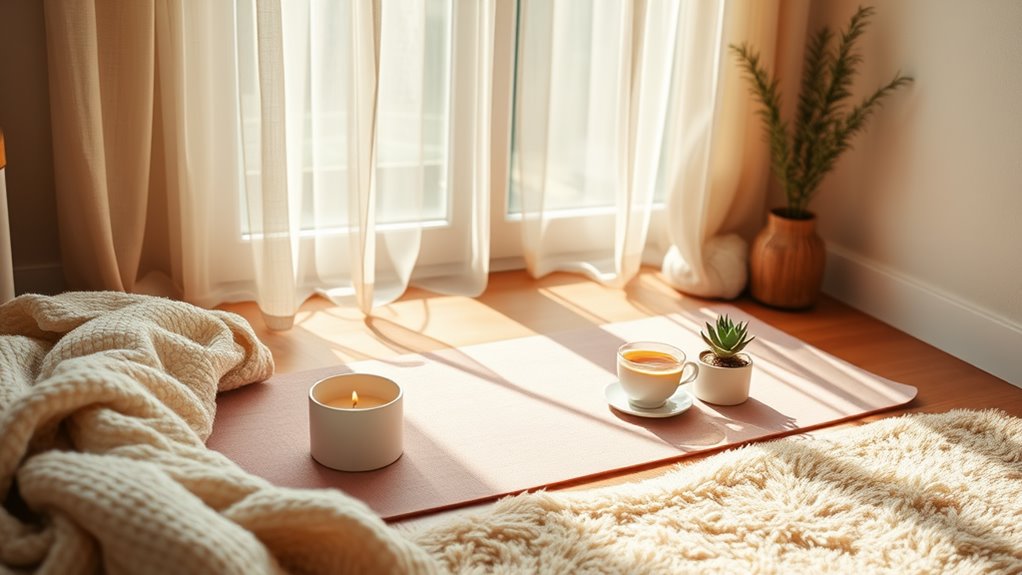Evening Routines That Helped Me Achieve a Peaceful Night’s Sleep
To achieve a peaceful night’s sleep, start by reducing screen time an hour before bed to boost melatonin production. Incorporate mindfulness techniques, like deep breathing or gentle yoga, to calm your mind. Create a sleep-friendly environment with a cool room, blackout curtains, and soft lighting. Stick to a consistent sleep schedule and avoid heavy meals late at night. Establish a relaxing wind-down routine and reflect on your day’s accomplishments. Discover more tips to enhance your nightly rest.
Key Takeaways
- Establish a consistent sleep schedule by going to bed and waking up at the same time daily, even on weekends.
- Create a screen-free wind-down routine, including reading or meditating, to enhance relaxation before sleep.
- Incorporate deep breathing exercises or gentle yoga to release tension and calm the mind at night.
- Keep your bedroom cool, ideally between 60°F and 67°F, to promote restful sleep quality.
- Reflect on daily gratitude or small victories to foster a positive mindset and reduce nighttime anxiety.
Reducing Screen Time for Better Sleep
As you wind down for the night, it’s essential to recognize how reducing screen time can greatly enhance your sleep quality. Dimming the blue light from your devices helps align your circadian rhythm with natural light-dark cycles. Studies show that one hour of screen time at bedtime increases insomnia risk by 59%. Additionally, effective nighttime rituals can significantly improve your overall sleep experience.
Consider implementing a screen-free zone, like your bedroom, to discourage late-night distractions. By turning off electronics at least one hour before bed, you’ll allow your body to produce the melatonin needed for restful slumber.
Instead of scrolling through social media or watching TV, replace these habits with calming activities, such as reading or meditation. Establishing these evening routines won’t only improve sleep hygiene but also facilitate quicker sleep induction, leading to more restorative nights.
Embrace this mastery for a healthier lifestyle.
Engaging in Mindfulness and Relaxation Techniques
To wind down effectively, incorporating mindfulness and relaxation techniques can make a big difference in your sleep quality. You can explore deep breathing exercises and yoga to release tension and calm your mind. Additionally, meditation can help create a peaceful mindset, setting the stage for a restful night. Regular practice of these techniques can enhance relaxation over time. Studies show that deep breathing can significantly lower cortisol levels, leading to improved stress relief and better sleep quality.
Meditation and Yoga Benefits
Engaging in mindfulness and relaxation techniques like meditation and yoga can greatly enhance your ability to unwind before sleep.
Meditation, particularly mindfulness, helps reduce insomnia, fatigue, and stress, allowing you to release the day’s mental clutter. By practicing meditation regularly, you trigger a physiological relaxation response that improves sleep quality. Studies have shown that mindfulness meditation can significantly alleviate insomnia and promote a sense of well-being. Additionally, incorporating breathing techniques into your meditation practice can further deepen your relaxation and calm the mind.
Meanwhile, gentle yoga stimulates your parasympathetic nervous system, alleviating muscle tension and promoting calmness. Poses like child’s pose and legs up the wall are particularly effective for relaxation. Customizing your meditation and yoga routines to fit your personal preferences guarantees a more profound impact. Together, these practices create a harmonious evening ritual that signals to your body that it’s time to shift into restful sleep.
Deep Breathing Techniques
Many people find that deep breathing techniques can be a powerful tool for relaxation and improving sleep quality. By practicing methods like the 4-7-8 technique, you’ll focus on long, deep breaths that reduce stress and enhance your overall well-being. Additionally, these practices can complement mindfulness and meditation to further promote a sense of peace. Try incorporating these techniques into your evening routine for maximum effectiveness.
| Technique | Methodology | Benefits |
|---|---|---|
| 4-7-8 Breathing | Inhale 4s, hold 7s, exhale 8s | Reduces anxiety, promotes calm |
| Slow Deep Breathing | 6 breaths per minute | Enhances relaxation, lowers stress |
| Guided Imagery | Combine with visualization | Improves mental clarity, enhances relaxation |
Consistency is key; practice these exercises about an hour before bed to reap the full benefits. Your mind and body will thank you! Additionally, engaging in deep breathing techniques like the 4-7-8 method may help manage cravings and reduce anger responses.
Creating a Sleep-Friendly Environment
To create a sleep-friendly environment, you need to focus on ideal room temperature, effective light control, and noise reduction strategies. Keeping your bedroom cool, dark, and quiet can greatly enhance your sleep quality. Incorporating relaxation techniques into your evening routine can also significantly improve your ability to unwind before bed. Let’s explore how these elements can transform your nightly routine.
Optimal Room Temperature
How can the temperature of your bedroom impact your sleep quality? Maintaining an ideal room temperature, typically between 60°F and 67°F, is essential for restful sleep.
When your environment’s too hot, it disrupts REM and slow-wave sleep, leading to poor rest. You can take control of your sleep experience by adopting these strategies:
- Experience deeper, more restorative sleep.
- Reduce nighttime awakenings and restlessness.
- Improve your overall health and well-being.
- Enhance your daily productivity and mood.
Light Control Techniques
Creating a comfortable sleep environment goes beyond just the right temperature; light control plays a significant role in ensuring quality rest.
You need to minimize exposure to bright and blue light, especially from screens, as it disrupts melatonin production and your circadian rhythm.
Consider installing blackout curtains to block external light and using dim, warm lighting in the evening to signal your body that it’s time to wind down.
Gradually dim the lights as bedtime approaches, and limit electronics to enhance your sleep readiness.
If your room can’t be fully darkened, wear an eye mask.
Noise Reduction Strategies
While you may have mastered light control in your bedroom, managing noise is equally essential for a restful night’s sleep.
To create a serene atmosphere, consider these effective noise reduction strategies:
-
Surround yourself with soft surfaces like thick rugs to absorb sound.
-
Use heavy curtains to block out external disturbances.
-
Invest in white noise machines to mask unwanted noises.
-
Seal gaps in windows and doors for ideal sound insulation.
Maintaining Consistent Sleep Schedules
Maintaining a consistent sleep schedule is essential for your overall well-being, as it helps regulate your internal body clock and enhances the quality of your sleep.
When you stick to a regular sleep-wake cycle, you strengthen your immune system and promote muscle recovery, leading to better physical health. You’ll also enjoy improved mood regulation, enhanced focus, and reduced anxiety, creating a more stable emotional landscape.
Synchronizing your sleep with your natural circadian rhythm guarantees easier sleep onset and promotes alertness during the day. To achieve this, set a fixed bedtime and wake-up time, even on weekends.
Gradual adjustments and a calming pre-bed routine can further solidify these habits, paving the way for long-term health benefits.
Dietary Modifications for Enhanced Sleep Quality
Your sleep quality can be greatly influenced by what you eat. To enhance your nights, consider these dietary modifications:
-
Embrace a rainbow of fruits and vegetables to combat insomnia.
-
Opt for a Mediterranean diet, rich in healthy fats and whole grains.
-
Incorporate tryptophan-rich foods like turkey and magnesium-packed nuts for calm.
-
Avoid late-night heavy meals that disrupt your slumber.
Focusing on these dietary choices not only supports better sleep but also improves your overall well-being.
Regular meal times and hydration also play a significant role, so prioritize consistency.
Establishing Effective Wind-Down Routines
Establishing an effective wind-down routine can considerably enhance your sleep quality, as it signals to your body that it’s time to relax. Aim for consistency; follow your routine even on weekends to support your circadian rhythm.
Start winding down at least 30 minutes before bed. Engage in deep breathing exercises or gentle stretches to release tension. Ditch screens during this time to avoid disrupting melatonin production, and consider reading a physical book or listening to calming music to unwind.
A warm bath can also prepare your body for sleep. These activities not only promote relaxation but also help clear your mind, making it easier to shift into a peaceful night’s sleep. Your body will thank you!
Reflecting on Gratitude and Planning for Tomorrow
As you settle into your evening routine, reflecting on gratitude and planning for tomorrow can create a powerful shift into restful sleep.
Embracing these practices not only enhances your sleep quality but also sets a positive tone for the next day.
-
Acknowledge the small victories that made you smile today.
-
Prioritize tasks to streamline your morning chaos.
-
Cultivate a sense of accomplishment through reflection.
-
Visualize a productive tomorrow, reducing anxiety.
Frequently Asked Questions
How Long Should I Spend on Mindfulness Practices Before Bed?
You should spend 3 to 5 minutes on mindfulness practices if you’re just starting. As you grow comfortable, aim for 10 to 15 minutes, ultimately reaching 20 to 30 minutes for deeper relaxation and enhanced sleep quality.
What Are the Best Non-Screen Activities to Do Before Sleep?
To enhance your pre-sleep routine, consider reading, journaling, or engaging in puzzles. Creative activities like coloring or knitting can soothe your mind, while meditation and deep breathing techniques promote relaxation and prepare you for restful sleep.
Can Essential Oils Improve My Sleep Quality?
Yes, essential oils can considerably improve your sleep quality. By using lavender or chamomile, you’ll create a calming environment that promotes relaxation, reduces anxiety, and enhances deep sleep, leading to a more restful night.
What Should I Do if I Wake up During the Night?
If you wake up during the night, try deep breathing to relax, avoid looking at screens, and focus on calming thoughts. If necessary, get out of bed briefly before returning to sleep.
How Can I Reduce Nighttime Anxiety Before Sleeping?
Picture a serene landscape as you breathe deeply, letting tension fade. Embrace progressive muscle relaxation and gentle stretching. Dim the lights, silence devices, and create a cool sanctuary for your mind to unwind and drift peacefully.
References
- https://www.rupahealth.com/post/5-essential-evening-routines-for-better-sleep
- https://lifeat.io/blog/how-to-build-a-night-routine-that-prepares-you-for-a-productive-tomorrow
- https://www.sleepstation.org.uk/articles/sleep-tips/wind-down-routine/
- https://justagirlandherblog.com/evening-routine/
- https://www.sleepcareonline.com/articles/ideal-bedtime-routine-for-adults/
- https://www.healthline.com/health-news/screen-time-bedtime-insomnia-risk
- https://www.artofliving.org/us-en/meditation/sleep/reduce-screentime-quality-sleep
- https://www.sutterhealth.org/health/screens-and-your-sleep-the-impact-of-nighttime-use
- https://www.sunrisehealthinfo.com/healthy-living/blog/screen-time-before-bed-how-tech-affects-sleep-habits
- https://integrishealth.org/resources/on-your-health/2023/december/how-does-screen-time-affect-your-sleep





